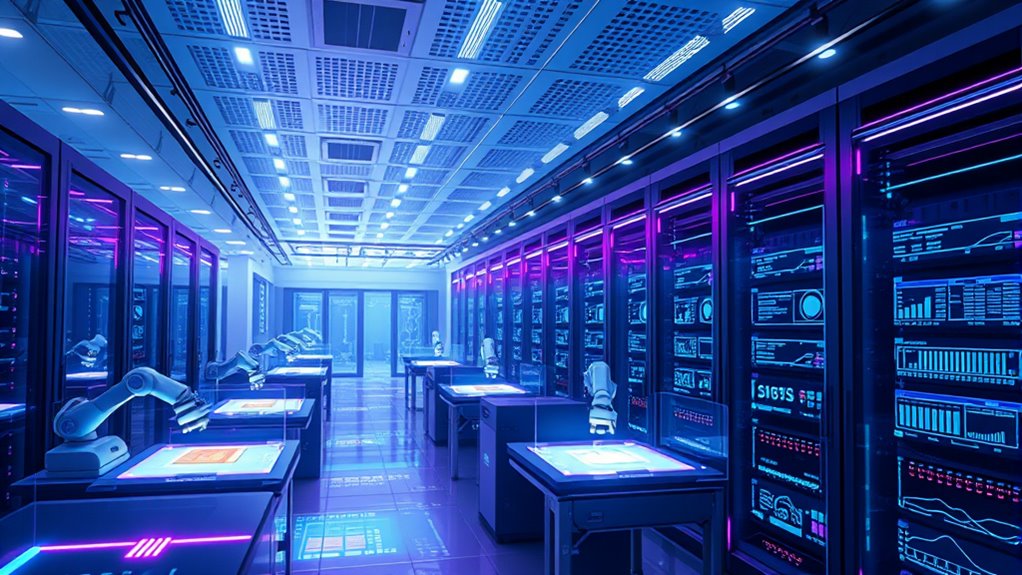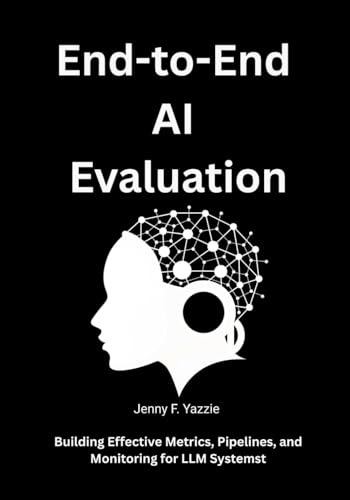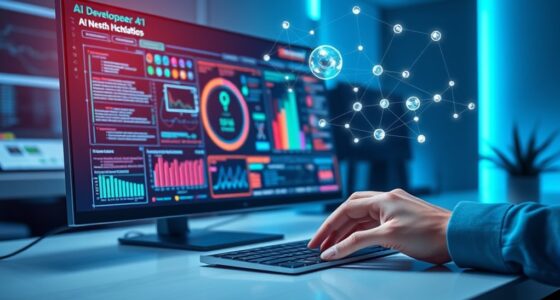The future of AI automation in DevOps is bright, as it will enable you to deliver software faster and more reliably. AI will act as a collaborative partner, handling routine tasks while you focus on innovation and strategy. Ethical considerations like transparency and fairness will become essential, ensuring responsible use. By embracing human-AI teamwork and continuous improvement, you’ll build resilient, adaptable systems that stay ahead. Stay tuned to discover how these innovations can transform your DevOps practices.
Key Takeaways
- AI will increasingly automate routine tasks, enabling faster and more reliable software delivery in DevOps pipelines.
- Human-AI collaboration will become essential, with AI serving as a partner to enhance decision-making and innovation.
- Ethical considerations, including transparency and bias prevention, will be integral to AI deployment and ongoing monitoring.
- Adaptive, smarter systems will be integrated into DevOps workflows, fostering continuous improvement and resilience.
- Training and guidelines will be vital to ensure responsible AI use, maintaining trust and alignment with organizational values.

As AI automation continues to evolve, it is transforming DevOps practices by enabling faster, more reliable software delivery. This shift isn’t just about speeding up processes; it’s about creating smarter, more adaptable systems that work seamlessly with your teams. As you integrate AI into your workflows, you’ll find that AI ethics becomes a critical consideration. You need to ensure that AI-driven decisions are transparent and fair, preventing biases and unintended consequences. Maintaining ethical standards helps you build trust with stakeholders and assures that automation complements human judgment rather than replacing it entirely. Human-AI collaboration becomes essential here — AI tools should serve as extensions of your expertise, empowering your team to focus on complex problem-solving rather than routine tasks. This partnership allows for a more agile and innovative DevOps environment, where human insights guide AI recommendations and automation handles repetitive, time-consuming operations.
You’ll notice that AI ethics influences how you design and deploy automation solutions. For example, when automating deployment pipelines or incident management, you’ll want to incorporate safeguards that prevent errors or biases from propagating. This involves ongoing monitoring and refinement of AI models, ensuring they align with your organizational values and compliance standards. As AI becomes more integrated into your DevOps practices, human oversight remains essential. It’s not about handing over control entirely to algorithms but about fostering a symbiotic relationship where humans set the strategic direction and AI handles the execution details. This human-AI collaboration boosts efficiency while preserving accountability, which is indispensable as AI systems take on more decision-making roles. Additionally, understanding the sound vibrations can help teams better understand how AI influences system behaviors and health, complementing technical insights with scientific principles. Recognizing the importance of privacy policies is also vital, as they guide responsible data handling during AI deployment. Moreover, fostering a culture of mindfulness can help teams stay attentive to ethical considerations and maintain a balanced perspective on AI’s role in their workflows.
Furthermore, understanding the 16PF personality traits can help teams better adapt to AI-driven changes by aligning roles with individual strengths. In the future, you’ll see that ethical AI use and collaboration are not optional but necessary for sustainable growth. As your teams adopt smarter automation tools, they’ll need to stay vigilant about AI’s limitations and biases. Continuous education and clear guidelines will help your organization navigate these challenges. Additionally, integrating expert voice actors into training materials or promotional content can improve communication about AI capabilities and ethical practices. Furthermore, developing a culture that values AI ethics encourages responsible innovation, ensuring that automation enhances your products and services without compromising integrity. The most successful DevOps teams will be those that embrace AI as a collaborative partner, respecting human oversight and ethical standards. This balanced approach ensures that AI automation remains a tool for empowerment rather than a source of risk, paving the way for a resilient, forward-thinking future in software development.

Agentic AI & DevOps: Strategy • Architecture • Human-AI Partnership
As an affiliate, we earn on qualifying purchases.
As an affiliate, we earn on qualifying purchases.
Frequently Asked Questions
How Will AI Automation Impact Devops Team Roles Long-Term?
AI automation will transform your DevOps team by enhancing team collaboration and streamlining workflows. You’ll see roles evolve as routine tasks become automated, allowing you to focus on strategic initiatives. Over time, your skills will need to adapt, emphasizing expertise in AI tools and data analysis. This shift encourages continuous learning, making your team more agile and capable of tackling complex challenges with greater efficiency.
What Are the Biggest Security Concerns With Ai-Powered Devops Tools?
You should be aware that 70% of organizations cite data privacy as a top concern with AI-powered DevOps tools. These tools can inadvertently expose sensitive data or become targets for insider threats if not properly protected. Active monitoring is essential to prevent unauthorized access, and implementing strict access controls helps defend against data breaches. Staying vigilant ensures your AI-driven DevOps environment remains secure and compliant.
How Can Small Startups Effectively Implement AI in Their Devops Processes?
You can effectively implement AI in your startup’s DevOps by leveraging cost-effective tools designed for small teams. Focus on scalable solutions that integrate easily with your existing processes, and prioritize automation to boost efficiency. Adopt startup strategies like starting small, testing AI features incrementally, and continuously learning from results. This approach helps you harness AI’s benefits without overwhelming your resources, setting a solid foundation for growth and innovation.
What Skills Will Devops Professionals Need to Thrive With AI Automation?
To thrive with AI automation, you’ll need strong skills in machine learning and data analysis. You must understand how to interpret data insights and develop models that improve deployment pipelines and system reliability. Staying current with AI tools and automation platforms is essential. You should also sharpen problem-solving skills, adapt to evolving tech, and collaborate effectively with data scientists and engineers to optimize AI-driven processes in DevOps.
How Does AI Automation Influence Compliance and Regulatory Standards?
AI automation substantially impacts compliance and regulatory standards by enabling automated audits and continuous compliance monitoring. You can rely on AI to quickly detect deviations, reduce human error, and guarantee policies are consistently followed. This proactive approach streamlines regulatory processes, saves time, and enhances accuracy. As a DevOps professional, embracing AI-driven compliance tools helps you maintain standards effortlessly, keeping your systems secure and compliant with evolving regulations.

DevOps for Beginners: A Beginner’s Guide to Mastering Modern Software Development, Automation, and CI/CD
As an affiliate, we earn on qualifying purchases.
As an affiliate, we earn on qualifying purchases.
Conclusion
As you look ahead, AI automation will transform your DevOps processes, making them more efficient and reliable. You’ll be able to detect issues faster, deploy updates seamlessly, and free up your team for more strategic tasks. Isn’t it exciting to think about a future where automation handles the routine, so you can focus on innovation? Embracing these advancements now puts you at the forefront of a smarter, more agile development world.

End-to-End AI Evaluation: Building Effective Metrics, Pipelines, and Monitoring for LLM Systems
As an affiliate, we earn on qualifying purchases.
As an affiliate, we earn on qualifying purchases.

AI-Augmented Software Development: Transforming Development Through Human-AI Collaboration
As an affiliate, we earn on qualifying purchases.
As an affiliate, we earn on qualifying purchases.









